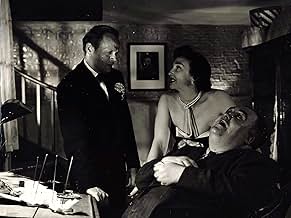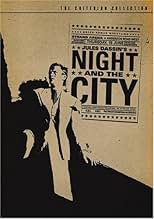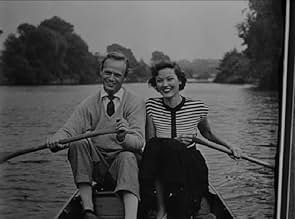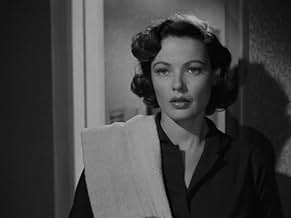VALUTAZIONE IMDb
7,8/10
16.115
LA TUA VALUTAZIONE
Un piccolo truffatore nonché procacciatore di un nightclub si avvantaggia di certe circostanze fortuite e prova a diventare importante come promotore di wrestling.Un piccolo truffatore nonché procacciatore di un nightclub si avvantaggia di certe circostanze fortuite e prova a diventare importante come promotore di wrestling.Un piccolo truffatore nonché procacciatore di un nightclub si avvantaggia di certe circostanze fortuite e prova a diventare importante come promotore di wrestling.
- Regia
- Sceneggiatura
- Star
Ken Richmond
- Nikolas of Athens
- (as Ken. Richmond)
Paul Beradi
- Diner
- (non citato nei titoli originali)
Derek Blomfield
- Young Policeman
- (non citato nei titoli originali)
Clifford Buckton
- Policeman
- (non citato nei titoli originali)
Ernest Butcher
- Bert
- (non citato nei titoli originali)
Peter Butterworth
- Thug
- (non citato nei titoli originali)
Naomi Chance
- Nightclub Hostess
- (non citato nei titoli originali)
Edward Chapman
- Hoskins
- (non citato nei titoli originali)
Recensioni in evidenza
For some reason Night and the City doesn't seem to the credit it deserves; possibly because it was director Jules Dassin's last American film before being blacklisted as a Communist. I wasn't born until the Cold War was winding down, but it seems that with movies like Night and the City to his credit, we could have turned a blind eye even if he really was a Commie.
Honestly this film deserves to rank up there with the likes of The Maltese Falcon, Double Indemnity, or Out of the Past. The scenes of our "hero" Harry Fabian (Richard Widmark, at his best) being chased through London's East End are as starkly beautiful as anything you'll ever see on film. For several minutes there isn't a single shade of gray, everything is literally black or white and the camera itself seems to have joined in hunting Harry. Then there's the long, semi-grotesque wrestling scene that took me totally by surprise, it's like something out of Fellini.
Widmark is utterly believable as Fabian, a charming two-bit grifter who works as a "club tout" but hatches one ill-fated get-rich-quick scheme after another. The rest of the cast is excellent as well, there isn't a cardboard character in the bunch, except maybe Harry's girl Marry (Gene Tierney) though its really more a flaw in the character than the actress. Mary's saintliness may be the writers' only slip-up though, every other character has the sort of depth that makes the film a joy to watch. They inexorably follow their own motivations, which, of course, rely on those of someone else, who inevitably has a goal of his or her own, which will eventually derail the plan of someone whom someone else is counting on (actually, the film is a little less twisted than this review ;-) Criterion has just (2/05) recently released Night and the City and never has the phrase "filmed in glorious black and white" been more appropriate. Before this film seemed to lurk in the shadows of AMC or TCM, only occasionally showing its face, as if it were one of the genre's minor works. Now, if you haven't seen it you have no excuse, and you're only hurting yourself.
Honestly this film deserves to rank up there with the likes of The Maltese Falcon, Double Indemnity, or Out of the Past. The scenes of our "hero" Harry Fabian (Richard Widmark, at his best) being chased through London's East End are as starkly beautiful as anything you'll ever see on film. For several minutes there isn't a single shade of gray, everything is literally black or white and the camera itself seems to have joined in hunting Harry. Then there's the long, semi-grotesque wrestling scene that took me totally by surprise, it's like something out of Fellini.
Widmark is utterly believable as Fabian, a charming two-bit grifter who works as a "club tout" but hatches one ill-fated get-rich-quick scheme after another. The rest of the cast is excellent as well, there isn't a cardboard character in the bunch, except maybe Harry's girl Marry (Gene Tierney) though its really more a flaw in the character than the actress. Mary's saintliness may be the writers' only slip-up though, every other character has the sort of depth that makes the film a joy to watch. They inexorably follow their own motivations, which, of course, rely on those of someone else, who inevitably has a goal of his or her own, which will eventually derail the plan of someone whom someone else is counting on (actually, the film is a little less twisted than this review ;-) Criterion has just (2/05) recently released Night and the City and never has the phrase "filmed in glorious black and white" been more appropriate. Before this film seemed to lurk in the shadows of AMC or TCM, only occasionally showing its face, as if it were one of the genre's minor works. Now, if you haven't seen it you have no excuse, and you're only hurting yourself.
Recently out on Criterion DVD, with a restored print, this is a very nice example of 1950s film noir, although when it was made the director, Jules Dassin, didn't even know there was a classification known as film noir. In fact, the DVD extras, which include a fairly recent interview with the aging Dassin is as captivating as is the movie itself. Back in the late 1940s when "blacklisting" was a reality, Dassin was essentially told, go to London quickly, make this movie quickly, it may be your last. He made "Night and the City" without ever reading the source material, the book, and the movie is apparently quite different. Two versions were made simultaneously, using the same source film, but with different musical composers and different film editors. The DVD extras contains excerpts to demonstrate some of the differences, including a drastically different ending.
Good movie, worth a viewing for the acting of underrated Richard Widmark who plays Harry Fabian, an American post-war hustler in London. Fabian had big ideas of half-baked schemes and always was hitting up a friend for a hundred quid here, 300 quid there, to finance his latest get rich quick scheme. In the extras we learn that Gene Tierney was requested for the part of Fabian's girl Mary Bristol, because she was in a bad way after a recent romantic breakup, and according to Dassin "was suicidal." This movie helped bring her back to a good state.
Googie Withers, an actress I had never heard of, is good as Helen Nosseross, married to the rich but disgusting Phil (Francis Sullivan) and just wanting to get a license for her own night spot and a chance to break away from her husband. She is forced to deal with Fabian, a decision that cost her dearly.
Perhaps the most interesting actor is Stanislaus Zbyszko, one time "world's strongest man" from Poland, in 1949 living in New Jersey. Even though he was unexperienced, he gives a super performance as an old retired wrestler Gregorius the Great, who was grooming his son for a wrestling career. Mike Mazurki plays his nemesis, The Strangler.
Although the story gets a bit complex in the various relationships, it simply distills into Fabian seeing an opportunity to contract Gregorius to feature a wrestling match that will allow Fabian, at least in his eyes, to "control" wrestling in London. But his various scams catch up with him and all does not turn out well, as is the case in a film noir.
Good movie, worth a viewing for the acting of underrated Richard Widmark who plays Harry Fabian, an American post-war hustler in London. Fabian had big ideas of half-baked schemes and always was hitting up a friend for a hundred quid here, 300 quid there, to finance his latest get rich quick scheme. In the extras we learn that Gene Tierney was requested for the part of Fabian's girl Mary Bristol, because she was in a bad way after a recent romantic breakup, and according to Dassin "was suicidal." This movie helped bring her back to a good state.
Googie Withers, an actress I had never heard of, is good as Helen Nosseross, married to the rich but disgusting Phil (Francis Sullivan) and just wanting to get a license for her own night spot and a chance to break away from her husband. She is forced to deal with Fabian, a decision that cost her dearly.
Perhaps the most interesting actor is Stanislaus Zbyszko, one time "world's strongest man" from Poland, in 1949 living in New Jersey. Even though he was unexperienced, he gives a super performance as an old retired wrestler Gregorius the Great, who was grooming his son for a wrestling career. Mike Mazurki plays his nemesis, The Strangler.
Although the story gets a bit complex in the various relationships, it simply distills into Fabian seeing an opportunity to contract Gregorius to feature a wrestling match that will allow Fabian, at least in his eyes, to "control" wrestling in London. But his various scams catch up with him and all does not turn out well, as is the case in a film noir.
The rise and fall of small-time hustler Harry Fabain is chronicled in this noir thriller by Director Jules Dassin.
This was Dassin's American swansong, completed just before being named by fellow director Ed Dmytryk before HUAK as a "communist," thus ending Dassin's American career.
He brought to "Night and the City" all the technique he acquired over years of quality movie making. Although born in Connecticut and raised and trained in the US, Dassin's work always had the look and feel of his European counterpart, Carol Reed.
The script here is a decent one with surprise turns, avoiding predictability. Franz Waxman's high pitched score adds excitement to the proceedings and Gene Tierney is a creditable second lead.
Yet it's Richard Widmark on whose shoulders the success of this film ultimately rests. It's not an easy role, as Fabian's character runs the gamut of emotional range as he struggles to wheel and deal his petty schemes amongst assorted lowlife types.
Widmark proves he's well up to the challenge, creating a strong portrait of a small time hood striving for positive payoffs through his callous cleverness.
It's a reminder of how talented and resourceful this actor is, and how he and Dassin meshed to create a film of impact.
Dassin, of course, went on to France after this to engage in a fabulous European period, while Widmark struggled to find scripts worthy of his formidable talents, which turned out to be few and far between.
This was Dassin's American swansong, completed just before being named by fellow director Ed Dmytryk before HUAK as a "communist," thus ending Dassin's American career.
He brought to "Night and the City" all the technique he acquired over years of quality movie making. Although born in Connecticut and raised and trained in the US, Dassin's work always had the look and feel of his European counterpart, Carol Reed.
The script here is a decent one with surprise turns, avoiding predictability. Franz Waxman's high pitched score adds excitement to the proceedings and Gene Tierney is a creditable second lead.
Yet it's Richard Widmark on whose shoulders the success of this film ultimately rests. It's not an easy role, as Fabian's character runs the gamut of emotional range as he struggles to wheel and deal his petty schemes amongst assorted lowlife types.
Widmark proves he's well up to the challenge, creating a strong portrait of a small time hood striving for positive payoffs through his callous cleverness.
It's a reminder of how talented and resourceful this actor is, and how he and Dassin meshed to create a film of impact.
Dassin, of course, went on to France after this to engage in a fabulous European period, while Widmark struggled to find scripts worthy of his formidable talents, which turned out to be few and far between.
My favorite Richard Widmark performance on the screen and probably his best work is Night and the City. This was director Jules Dassin's last film before settling in Europe in the wake of the blacklist and it has a first rate cast tuned to a fine pitch, like an orchestra without a bad note in it.
Harry Fabian is this smalltime American hustler/conman who's settled in London and always working that middle ground netherworld between the law and outright gangsterism. He really isn't a very likable man and the trick is to keep the audience care what's happening to him. This is the test of a great actor and Widmark is fully up to the challenge.
Fabian while working one of his cons overhears a piece of information about the father/son relationship between champion Graeco-Roman wrestler Gregorius the Great and gangster/promoter Cristo who is the London version of Vince McMahon. He cons Gregorius into thinking he wants to promote old style wrestling like Gregorius used to do. That con game sets in motion the events of the film that ultimately end in tragedy.
The cast is uniformly fine, but one performance really stands out, that of Stanislaus Zbyzsko as Gregorius. He was a real professional wrestling champion back in the day when it was real. Zbyzsko invests so much of his own life and reality as Gregorius that he's really something special. His scenes with Herbert Lom as his son are so good they go far beyond the plane of mere acting. It's some of the best work Lom has ever done as well.
How there weren't a few Oscar nominations from this is a mystery for me. For those who like film noir, this should be required viewing. Especially for you Richard Widmark fans.
Harry Fabian is this smalltime American hustler/conman who's settled in London and always working that middle ground netherworld between the law and outright gangsterism. He really isn't a very likable man and the trick is to keep the audience care what's happening to him. This is the test of a great actor and Widmark is fully up to the challenge.
Fabian while working one of his cons overhears a piece of information about the father/son relationship between champion Graeco-Roman wrestler Gregorius the Great and gangster/promoter Cristo who is the London version of Vince McMahon. He cons Gregorius into thinking he wants to promote old style wrestling like Gregorius used to do. That con game sets in motion the events of the film that ultimately end in tragedy.
The cast is uniformly fine, but one performance really stands out, that of Stanislaus Zbyzsko as Gregorius. He was a real professional wrestling champion back in the day when it was real. Zbyzsko invests so much of his own life and reality as Gregorius that he's really something special. His scenes with Herbert Lom as his son are so good they go far beyond the plane of mere acting. It's some of the best work Lom has ever done as well.
How there weren't a few Oscar nominations from this is a mystery for me. For those who like film noir, this should be required viewing. Especially for you Richard Widmark fans.
In London, the swindler Harry Fabian (Richard Widmark) is an ambitious loser, frequently taking money from his girlfriend Mary Bristol (Gene Tierney). When he meets the famous Greco-Roman wrestler Gregorius the Great (Stanislaus Zbyszko) in the arena of his son and the wrestling lord Kristo (Herbert Lorn), he plans a scheme to become successful. He cheats Greorious, promising clean combats in his own arena, and the old man accepts the partnership. However, without money to promote the fight, he invites his boss and owner of a nightclub Phil Nosseross (Francis L. Sullivan) to be his partner, but is betrayed and his business fails ending in a tragedy.
"Night and the City" is a great film-noir, with many twists and another excellent performance of Richard Widmark. The story shows the underworld of London, with low-lives, hustlers, beggars, gamblers and other amoral characters through a magnificent black and white cinematography. The direction of Jules Dassin is sharp and the screenplay perfectly develops the characters and the story in an excellent pace. The Brazilian distributor Oregon Filmes / Fox has one of the best collections of movies labeled "Tesouros da Sétima Arte" ("Treasures of the Seventh Art"). Unfortunately, most of their DVDs shamefully have problems while playing the film, maybe because of the lack of quality of the laboratory they use. My vote is nine.
Title (Brazil): "Sombras do Mal" ("Shadows of Evil")
Note: On 10 October 2016, I saw this film again.
"Night and the City" is a great film-noir, with many twists and another excellent performance of Richard Widmark. The story shows the underworld of London, with low-lives, hustlers, beggars, gamblers and other amoral characters through a magnificent black and white cinematography. The direction of Jules Dassin is sharp and the screenplay perfectly develops the characters and the story in an excellent pace. The Brazilian distributor Oregon Filmes / Fox has one of the best collections of movies labeled "Tesouros da Sétima Arte" ("Treasures of the Seventh Art"). Unfortunately, most of their DVDs shamefully have problems while playing the film, maybe because of the lack of quality of the laboratory they use. My vote is nine.
Title (Brazil): "Sombras do Mal" ("Shadows of Evil")
Note: On 10 October 2016, I saw this film again.
Lo sapevi?
- QuizDirector Jules Dassin made the film while in the process of being blacklisted. Fox studio chief Darryl F. Zanuck told him it could possibly be the last film he'd ever direct, so he should shoot the most expensive scenes first so the studio wouldn't be able to blacklist him until it was completed.
- BlooperAs Harry is being chased through the streets of London at night, he runs down a set of stairs, then turns and runs down a lit street. In the foreground, the cameraman and director's shadows are clearly outlined against the street.
- Citazioni
Opening voice-over: Night and the city. The night is tonight, tomorrow night... or any night. The city is London.
- Versioni alternativeThere are two versions of this film: the British release and the International/American release. Some examples are: a differing voice-over speech; some changed dialogue; the opening scene where Harry returns home after 3 days away is a different take and the nightclub scenes are longer in the British version. The scores of the two films are also entirely different and alternate shots are used at the ending in the British version.
- ConnessioniEdited into American Cinema: Film Noir (1995)
- Colonne sonoreHere's to Champagne
(uncredited)
Written by Noel Gay
Performed by Gene Tierney (voice dubbed by Maudie Edwards)
I più visti
Accedi per valutare e creare un elenco di titoli salvati per ottenere consigli personalizzati
- How long is Night and the City?Powered by Alexa
Dettagli
- Data di uscita
- Paese di origine
- Lingua
- Celebre anche come
- Nella città la notte scotta
- Luoghi delle riprese
- Hammersmith Bridge, Hammersmith, Londra, Inghilterra, Regno Unito(Harry runs across this bridge after leaving Figler's hideout, running to Anna O'Leary's boat shop)
- Aziende produttrici
- Vedi altri crediti dell’azienda su IMDbPro
Botteghino
- Lordo in tutto il mondo
- 43.024 USD
- Tempo di esecuzione
- 1h 41min(101 min)
- Colore
- Proporzioni
- 1.37 : 1
Contribuisci a questa pagina
Suggerisci una modifica o aggiungi i contenuti mancanti




































